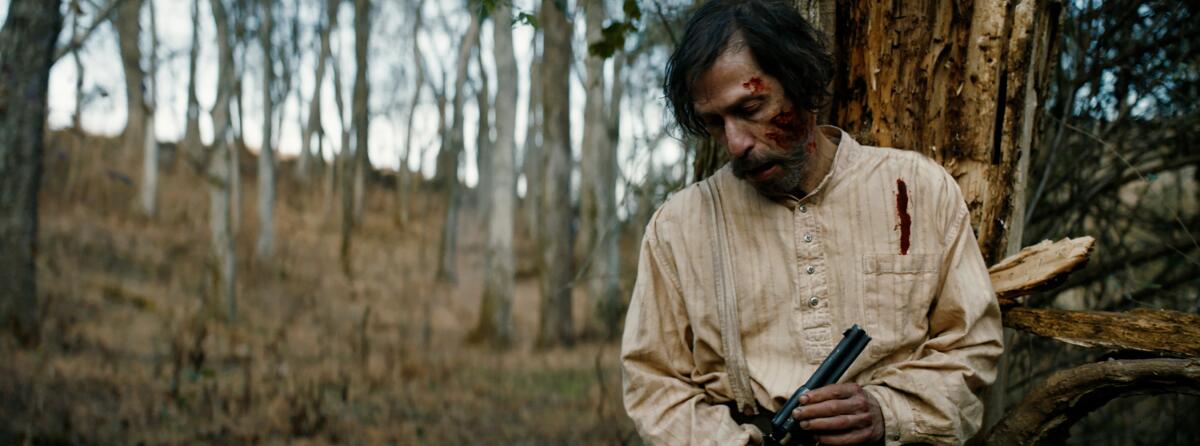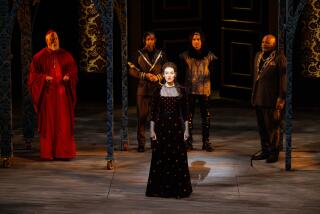Review: ‘Old Henry’ and star Tim Blake Nelson have a few tricks up their sleeves

- Share via
The Times is committed to reviewing theatrical film releases during the COVID-19 pandemic. Because moviegoing carries risks during this time, we remind readers to follow health and safety guidelines as outlined by the Centers for Disease Control and Prevention and local health officials.
The last time most of us saw Tim Blake Nelson in the saddle, he was the warblin’ deadeye from the title of the Coen brothers’ “The Ballad of Buster Scruggs,” a jovial caricature of the philosophizing cowboy (and the filmmakers’ own reputation for cruelly funny storytelling). But also, because of the actor’s reliability, a figure that still felt rooted in the history of the horse opera.
I have no idea if filmmaker Potsy Ponciroli wrote the coiled, small-scale western “Old Henry” for Nelson’s particular gifts with frontier authenticity — again, he’s the guy in the movie’s name, only this time a full-on lead — but it sure does seem like Ponciroli did. Seeming is a lot of what “Old Henry” is about too: what looks cut and dried but might not be, appears bucolic but isn’t exactly, and what only sounds truthful. Westerns have gotten a lot of mileage out of the disruption of appearances, especially when it comes to the clash between civilization and lawlessness, and “Old Henry” is no different.
Ponciroli wastes no time trying to unsettle us that way, with an opening in which a three-man posse — led by Stephen Dorff in a Stetson and sporting a star on his coat, and featuring a solemn Mexican tracker (Max Arciniega) — hunts down a terrified man we take to be a fugitive. Then Dorff’s character, upon catching him, does something we typically don’t expect of those tasked with upholding the law, and our sense of who’s good and who’s bad is put on alert.
Right after, we meet Henry (Nelson), farming with his teenage son Wyatt (Gavin Lewis) and brother-in-law Al (Trace Adkins), who lives nearby. A stern, hard-toiling widower who’s settled in the Oklahoma Territory — it’s 1906, we’re told — Henry not only has a handful tending to his secluded patch of land, but also dealing with a backtalking adolescent who feels trapped and is itching to flee.
What forces father and son to find common ground is a wounded stranger (Scott Haze) with a satchel of money and a story about bad men out to get him. His presence invites trouble, but it also brings out in the reclusive Henry a mysterious knack for homestead security and the gunslinging arts that invites an entirely different set of questions about just who is who in this scenario.
Between the mother’s grave on the property, the portrait of a hard farmer’s life, and the sense that Henry has a past that was tamed by love, it’s pretty obvious Ponciroli has seen (and probably reveres, as we all should) “Unforgiven.” But where Clint Eastwood’s film was a tragic turnabout built on masculine weakness, and that viewed guns as crutches, “Old Henry” is happy to spruce up a sidelined genre’s well-worn trails, presenting the notion of a taciturn man of hidden talents outnumbered but unbowed as the height of movie pleasure. And Nelson, smartly, grasps that shifting from supporting to lead isn’t about letting go the economies of character actor portraiture, but stretching those qualities — he’s great fun to watch transforming Henry’s resolve while staying a concerned father.
The movie’s sense of good and evil isn’t terribly complicated, and for the purposes of a taut homage eager to deliver third-act justice the old-fashioned way, that’s just fine. Ponciroli shows natural flair for holstered and unholstered suspense (if not always story logic), plus he’s got a worthy partner in the muted exteriors and sparsely lit interiors of John Matysiak’s cinematography, and a cast that dutifully plays along with every stare-down and line of colorfully poetic cowboy dialogue.
But for all that’s familiar about “Old Henry,” it does have a trick up its sleeve — one that, blessedly, doesn’t belong to the regrettable movie trend in twists as a reason for being. In this case, it feels earned, narratively and thematically, applying directly to our enjoyment of westerns as the province of mythic storytelling, shadowy histories and gritty realities.
'Old Henry'
Not rated
Running time: 1 hour, 39 minutes
Playing: Starts Oct. 1, Laemmle Monica Film Center, Santa Monica
More to Read
Only good movies
Get the Indie Focus newsletter, Mark Olsen's weekly guide to the world of cinema.
You may occasionally receive promotional content from the Los Angeles Times.










